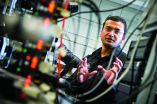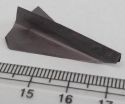(Press-News.org) ANN ARBOR, Mich. -- A record number of people are surviving heart attacks and stroke but those who do may experience a sharp decline in physical abilities that steadily accelerates over time, according to a new nationally-representative study led by the University of Michigan.
Heart attack and stroke were associated with a rapid decline in survivors' ability to take care of themselves over the next 10 years, many requiring long-term assistance for daily activities like dressing, bathing, grocery shopping and managing finances. Stroke survivors also appeared to be at a higher risk of depression and mental declines, including memory loss.
The findings appear in Circulation: Cardiovascular Quality and Outcomes.
"More people are surviving heart attack and stroke than ever before but the long-term consequences for survivors may be much greater than we thought," says lead author Deborah Levine, M.D., M.P.H. assistant professor of internal medicine in the division of general medicine and the Stroke Program in the U-M Medical School and researcher in the VA Center for Clinical Management Research.
"We found that over time, survivors had increasing difficulty performing everyday tasks like walking, bathing, shopping and managing money and that these struggles got progressively worse every year following a heart attack or stroke."
Over 10 years, survivors of heart attack gained approximately 1.5 to 3.5 new functional limitations (problems with performing daily tasks) and survivors of stroke gained approximately 3.5 to 4.5 limitations.
In 2010, the U.S. saw 7.6 million heart attack survivors and 6.8 million stroke survivors, with rates expected to increase by 25 percent over the next two decades due to treatment advances and an aging population. Meanwhile, the supply of caregivers for older adults is expected to decline dramatically over the same time period.
"Our findings suggest that heart attack and stroke survivors should be screened and monitored for functional disability long after discharge from the hospital because patients may need additional help with activities of daily living over the years after heart attack and stroke," says senior author Theodore Iwashyna, M.D., Ph.D. associate professor of internal medicine at the U-M Medical School and researcher in the Institute of Social Research and the VA Center for Clinical Management Research.
"Our research suggests an urgent need to understand whether the acute and accelerated functional disability after heart attack and stroke are the result of incomplete rehabilitation from the initial hospitalization, additional vascular events, behavioral changes, or other mechanisms."
The researchers also found that the new functional limitations contributed to significant increases in depressive symptoms among survivors of heart attack and stroke. The risk of developing severe depressive symptoms were 20% greater for every new functional limitation gained after heart attack and 34% greater for every new functional limitation gained after stroke.
"As we continue to see more survivors of heart attack and stroke, we expect a dramatic increase in demand for chronic care, which not only takes a tremendous toll on patients and their families but will also mean significant demands and expenses for our healthcare system, caregivers and other resources, says Levine. "Further research is needed to develop cost-effective methods of care to best manage the needs of this growing and vulnerable population."
Researchers analyzed Medicare records from 1998-2010 and from the Health and Retirement study, a national survey of older Americans funded by the National Institute on Aging and based at the U-M Institute for Social Research (ISR).
The study included 391 heart attack survivors and 370 stroke survivors.
INFORMATION:
Other authors: Dimitry Davydow, M.D., M.P.H. and Catherine Hough, M.D., M.Sc, of the University of Washington. Kenneth Langa, M.D., Ph.D. and Mary A.M. Rogers, Ph.D., of the Department of Internal Medicine at U-M. All U-M authors from this study are members of the U-M Institute for Healthcare Policy and Innovation. Langa is also with the U-M School of Public Health.
Disclosures: None
Funding: The Health and Retirement Study is sponsored by the National Institute
on Aging (U01 AG09740) and the Social Security Administration.
Levine received research support from the National Institutes of
Health (NIH; P30DK092926 and K23AG040278). Davydow received
research support from the NIH (KL2 TR000421). Iwashyna
received research support from the NIH (K08, HL091249) and VA
HSR&D (IIR 11-109).
Reference: "Functional Disability and Cognitive Impairment After
Hospitalization for Myocardial Infarction and Stroke," Circ Cardiovasc Qual Outcomes, Nov.11, 2014.
This news release is available in French. Montreal, November 11, 2014 -- Regardless of whether a business has been in the family for one year or one thousand, the person in charge typically hopes that handing the reins to a close relative will ensure security for future generations. But that's easier said than done, given that 30 per cent of firms make it to the second generation of family ownership, and only 12 per cent make it to the third.
Concordia University management professor Peter Jaskiewicz believes there's hope for business owners who stay current by focusing ...
Researchers at the University of Notre Dame have designed a simple, yet highly accurate traffic prediction model for roadway transportation networks. They have recently published their work in the journal Nature Communications.
"Transportation networks and in particular the highway transportation network are like the body's circulatory system for the nation," says Zoltán Toroczkai, professor of physics at the University of Notre Dame, who co-authored the study with physics graduate student Yihui Ren and national and international collaborators.
The team's model ...
CORAL GABLES, Fla. (November 11, 2014) -- Researchers at the University of Miami (UM) have developed a family-focused, culturally-informed treatment for schizophrenia (CIT-S). The program is one of the first to incorporate elements of the patient's cultural background as part of therapy. The findings are published online ahead of print, in the Journal of Family Psychology.
The novel treatment aimed to reduce patients' symptoms and improve patient and caregiver emotional well-being, explains Amy Weisman de Mamani, Associate Professor of Psychology in the College of Arts ...
As baby boomers reach their sunset years, shifting nationwide demographics with them, the financial burden of Alzheimer's disease on the United States will skyrocket from $307 billion annually to $1.5 trillion, USC researchers announced today.
Health policy researchers at the USC Leonard D. Schaeffer Center for Health Policy and Economics used models that incorporate trends in health, health care costs, education and demographics to explore the future impact of one of humanity's costliest diseases on the nation's population.
Other key findings include:
From 2010 to ...
A University of Colorado Cancer Center study published online this week in the journal Molecular Cancer Therapeutics reports anti-cancer activity in 10 out of 11 patient tumor samples grown in mice and treated with the experimental drug TAK-733, a small molecule inhibitor of MEK1/2. While the drug is conceived as a second-generation inhibitor in patients harboring the BRAF mutation, the study shows drug activity in melanoma models regardless of BRAF mutation status. Treated tumors shrunk up to 100 percent.
"The importance of this molecule is that it's a next-generation ...
A University of Texas at Arlington physics team is using their expertise in the field of optics and photonics to advance new methods in areas such as mapping the neural circuitry of the brain and guiding neurons to potentially repair damage in the body.
Samarendra Mohanty, an assistant professor of physics, leads the Biophysics and Physiology Lab in the UT Arlington College of Science. He is co-author on two papers published this month. In one published by the online journal PLOS ONE Nov. 10, researchers in Mohanty's lab described using a method called "two-photon optogenetic ...
Making a paper airplane in school used to mean trouble. Today it signals a promising discovery in materials science research that could help next-generation technology -like wearable energy storage devices- get off the ground. Researchers at Drexel University and Dalian University of Technology in China have chemically engineered a new, electrically conductive nanomaterial that is flexible enough to fold, but strong enough to support many times its own weight. They believe it can be used to improve electrical energy storage, water filtration and radiofrequency shielding ...
November 11, 2014 - Several lines of research have opened exciting new frontiers in scientific understanding and clinical management of bipolar disorder. Recent advances in bipolar disease research are described in this month's special issue of Harvard Review of Psychiatry. The journal is published by Lippincott Williams & Wilkins, a part of Wolters Kluwer Health.
Bipolar disease is a "prevalent, complex, and hard-to-treat illness [leading] to extreme and erratic shifts of mood, thinking, and behavior, with a very high risk of suicide as well as increased risks of dying ...
In multiple sclerosis, the immune system goes rogue, improperly attacking the body's own central nervous system. Mobility problems and cognitive impairments may arise as the nerve cells become damaged.
In a new study, researchers from the University of Pennsylvania and co-investigators have identified a key protein that is able to reduce the severity of a disease equivalent to MS in mice. This molecule, Del-1, is the same regulatory protein that has been found to prevent inflammation and bone loss in a mouse model of gum disease.
"We see that two completely different ...
DALLAS - November 11, 2014 - UT Southwestern Medical Center researchers have determined the specific type of cell that gives rise to large, disfiguring tumors called plexiform neurofibromas, a finding that could lead to new therapies for preventing growth of these tumors.
"This advance provides new insight into the steps that lead to tumor development and suggests ways to develop therapies to prevent neurofibroma formation where none exist today," said Dr. Lu Le, Assistant Professor of Dermatology at UT Southwestern and senior author of the study, published online and ...



